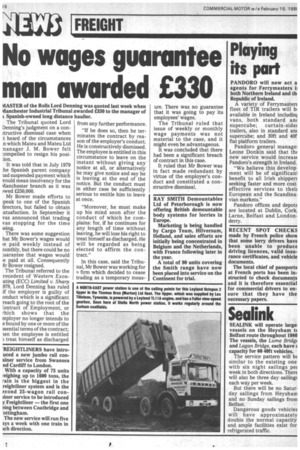No wages guarantee man awarded £330
Page 20

If you've noticed an error in this article please click here to report it so we can fix it.
VIASTER of the Rolls Lord Denning was quoted last week when Vlanchester Industrial Tribunal awarded £330 to the manager of a Spanish-owned long distance haulier.
The Tribunal quoted Lord Denning's judgment on a con3tructive dismissal case when t heard of the circumstances n which Mateu and Mateu Ltd manager J. M. Bower felt 1..ompe1led to resign his posi It was told that in July 1979 he Spanish parent company lad suspended payment which vould mean insolvency for the danchester branch as it was iwed £250,000.
Mr Bower made efforts to ,peak to one of the Spanish lirectors, but failed to obtain atusfaction. In September it vas announced that trading vas stopping for the time There was some suggestion hat Mr Bower's wages would le paid weekly instead of aonthly, but there could be no ,uarantee that wages would te paid at all. Consequently 4r Bower resigned.
The Tribunal referred to the recedent of Western Excaating (ECC) Limited v. Sharp 978, Lord Denning has ruled if the employer is guilty of onduct which is a significant reach going to the root of the :ontract of Employment, or Thich shows that the mployer no longer intends to e bound by one or more of the ssential terms of the contract; len the employee is entitled ) treat himself as discharged from any further performance.
"If he does so, then he terminates the contract by reason of the employer's conduct. He is constructively dismissed. The employee is entitled in this circumstance to leave on the instant without giving any notice at all, or alternatively he may give notice and say he is leaving at the end of the notice. But the conduct must in either case be sufficiently serious to entitle him to leave at once.
"Moreover, he must make up his mind soon after the conduct of which he complains: for, if he continues for any length of time without leaving, he will lose his right to treat himself as discharged. He will be regarded as being elected to affirm the contract."
In this case, said the Tribunal, Mr Bower was working for firm which decided to cease trading as a temporary meas ure. There was no guarantee that it was going to pay its employees' wages.
The Tribunal ruled that issue of weekly or monthly wage payments was not material to the case, and it might even be advantageous.
It was concluded that there had been a significant breach of contract in this case.
It ruled that Mr Bower was in fact made redundant by virtue of the employer's conduct and constituted a constructive dismissal.
























































































































